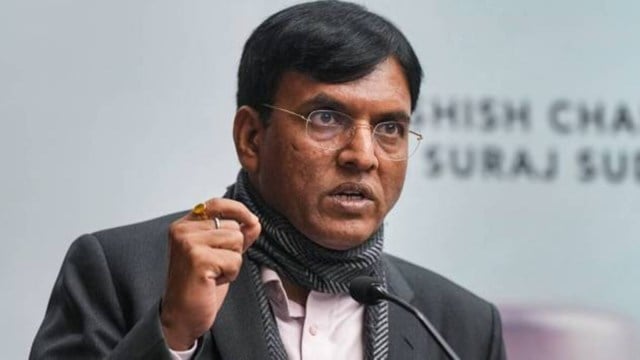Mandaviya flags Covid-19 risk for heart attack: Doctor explains what it means for you
'Before you start any exercise regimen, get your heart checked beforehand, so that you are aware about its status. You can commence and grade your exercise/activity accordingly,” says Dr Sameer Dani, director, cardiology services, Apollo CVHF Heart Institute
 Union Health Minister Mansukh Mandaviya (File Photo)
Union Health Minister Mansukh Mandaviya (File Photo) Union Health Minister Mansukh Mandaviya on Monday advised those who had suffered from severe COVID-19 infection not to exert themselves too much while exercising and staying away from hard labour for some time. Quoting an Indian Council of Medical Research (ICMR) study, he said, “It has recommended that those who had severe Covid should desist from extra labour; that they should stay away from continuous labour, laborious running, exercise, etc, for a specified short period, meaning a year or two, so that heart attacks can be prevented.”
While Mandaviya’s statement is generic advice, what do we know about COVID19’s link with heart ailments so far?
Cardiologists believe there is a definite link between COVID-19 and heart ailments in the short-term, especially those that developed within two and three months in recovered patients. Says Ahmedabad-based cardiologist Dr Sameer Dani, director, cardiology services, Apollo CVHF Heart Institute, “We have seen an increased incidence of vascular thrombosis or clotting, not only in the heart but in other blood vessels as well. We found clots in kidney patients when there was no reason for them to develop blockages. Normally, blood clots occur in people with narrow arteries.” Medical literature has shown how the COVID-19 virus affects clotting, wherein it inflames the inner vascular lining.
Dr Dani remembers a bypass patient who had COVID-19 three months after surgery. When he complained of heart issues six months after he had recovered, doctors initially thought his bypass grafts had failed. When he saw the angiography, he realised the bypass grafts were fine but new blockages and clots had developed, which are very unusual in post-surgery patients. “So here, a 10-20 per cent pre-bypass blockage had escalated to around 90 per cent blockage in around six months’ time,” says Dr Dani, who has seen the pattern repeated in at least three patients.
While cardiologists around the world are yet to define and quantify the exact link between COVID-19 and heart disease, Dr Dani says there is a correlation. However, past correlation of heart ailments with flu has ascertained that those with a history of flu had suffered more heart attacks or failures. That’s why WHO recommends all heart patients to take the flu shot.
What about the link between COVID-19 and heart ailments in the long-term?
According to Dr Dani, COVID-19 may have triggered or aggravated other causative factors of heart attacks like stress and diabetes. Additionally, with a lack of standardised care that was adopted during COVID-19, he points out it would be difficult to study the effects of steroids and other medicines. “Some people were given hundreds of milligrams of steroids when the recommendation was 6-8 mg a day, because doctors, too, were scared and there was no clear-cut understanding of the disease,” says Dr Dani.
Given your COVID-19 history, is it advisable to undergo a health check-up before you take up any physical activity?
If you are embarking on an unusual activity, say an intensive exercise regimen, you must take the tests. Performing the dandiya during Navratri or any energetic dance form would also count as an intensive exercise activity. “Before you start any exercise regimen, get your heart checked beforehand, so that you are aware about the status of your heart health. You can commence and grade your exercise/activity accordingly,” says Dr Dani. Our altered lifestyle over the years with unhealthier diet, sedentary habits, decrease in daily physical activity and insufficient consumption of fruits and vegetables has anyway upped our risk threshold. COVID-19 has just accelerated their impact, adds Dr Dani. “The incidence of heart ailments has been higher among the young in the past 25 years and their proportion is only increasing every year,” he says.




- 01
- 02
- 03
- 04
- 05



























